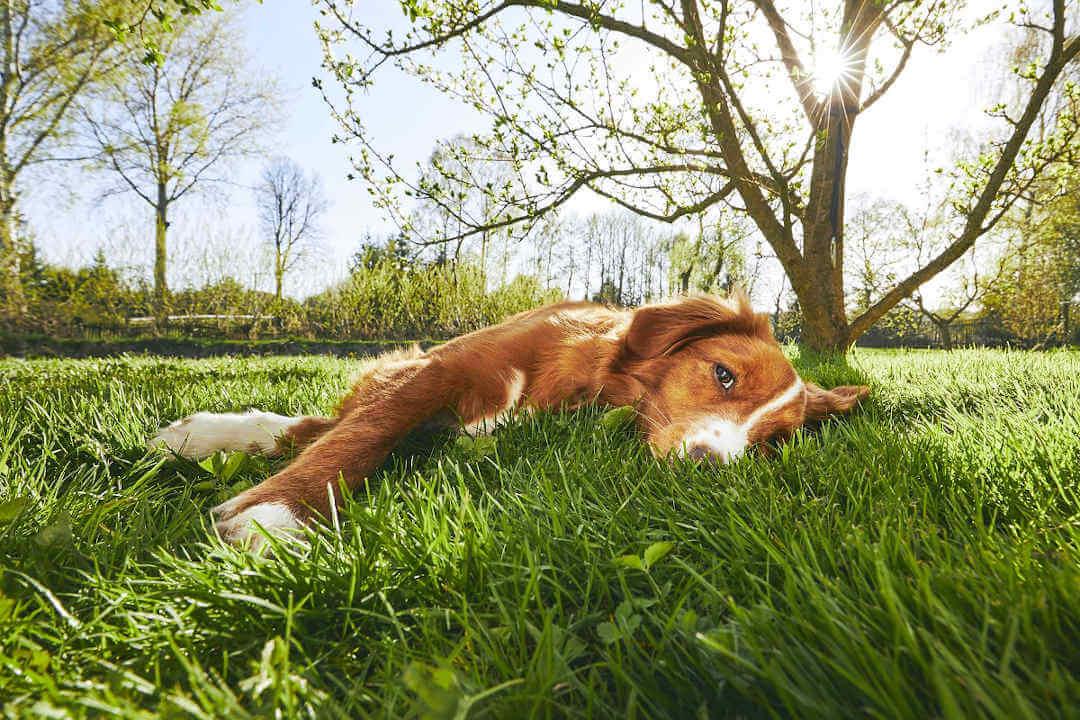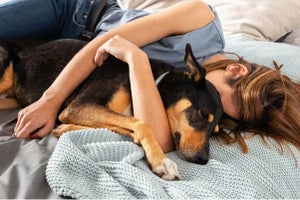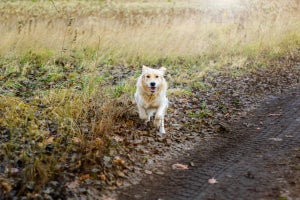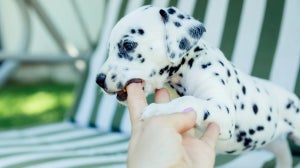
We’ve all looked at our dog when they are asleep and wondered whether they are dreaming – and if so, what about. Despite our fairly limited understanding of dreams, we attach great significance and meaning to them. The curiosity about our pet’s dreams comes from our desire to learn a little more about the personality and inner workings of the creatures we love so dearly. People have been asking questions like this for thousands of years – even the ancient Greek philosopher Aristotle wrote about whether animals could dream. Luckily for us, modern science has provided some answers the Greeks didn’t have. Here, James Wellbeloved explores what might be going on in our pets’ heads while they sleep.
RANDOM EYE MOVEMENT SLEEP
Scientists agree that our pets at least experience similar features of sleep to us. Human sleep is split into stages, the most famous of these being the Random Eye Movement (REM) stage. This is the phase of sleep in which most dreaming seems to occur. Since then, scientists have found that almost all mammals and birds experience this phase of sleep, although cold-blooded animals generally don’t seem to. It is often assumed that the eye movement that occurs during the REM stage is a reaction to what we are seeing in our dreams. We only move our eyes as we are mostly unable to move the rest of our body throughout the REM stage. For our pets to experience this REM sleep tells us that they might be dreaming too. You can probably even observe this in your own pet. Approximately 20 minutes after dogs fall asleep, they will enter their first round of REM sleep. If you watch carefully, you should see their breathing becomes shallow and less regular, while their eyes will begin to move quickly under their eyelids. This probably means they’re dreaming.

EVIDENCE FOR PETS DREAMING
Although we can’t say definitively that eye movement during the REM stage is your dog responding to dreams, there is other evidence that indicates animals dream in this stage too. In general, neither humans nor animals can move during the REM stage of sleep. However, in studies where scientists have enabled sleeping cats to move, they’ve been seen to stalk prey, arch their backs and move their heads to look at non-existent objects. In other words, the cats were responding to things they thought they could see while they were asleep, like when a human sleepwalks. This shows they are visualising something in their brains to respond to, i.e., they are dreaming.
WHAT DO ANIMALS DREAM ABOUT?
So now we know that animals probably do dream, we all want to know what they dream about. To answer this, we must try to understand why animals dream. Luckily, there is more evidence to help with this. Although the purpose of sleep is still not widely understood, scientists believe that one of its major functions is to process and consolidate our memories. They also believe this to be true of animals as well as humans. Scientists monitored the brains of rats running around a maze and then sleeping afterwards. They found identical brain signals occurring at both times. In other words, the rats were remembering the maze as they slept. Furthermore, scientists studying zebra finches figured out which brain signals linked to each song note when they were learning to sing. By monitoring the birds’ brain signals as they slept, the scientists were able to see that the finches sang these songs in their heads – they were consolidating their learnings from the day during their sleep and practicing what they had learnt. As in humans then, we can see that quite often an animal’s dreams are linked to what they’ve done in the day and to their memory.
WHAT DO DOGS DREAM ABOUT?
When we dream, we don’t just remember what we’ve done during the day. There is a fantastical element to dreaming, with dreams being linked to things we want as much as things we’ve done. So, is what our dogs see when they sleep only ever a reflection of daily activity or can it be fantasy too? As dogs cannot express their dreams to us verbally, it’s hard to answer this question. However, dogs possess more sophisticated brains than rats or birds and so we may infer that their dreams are more complex. Your dog is almost certainly dreaming about things they’ve experienced that day, but also probably about things they like. Scientists have in fact carried out similar research with dogs as they have with cats, allowing them to move during the REM stage of their sleep to observe their behaviour. As with the cats, the sleeping dogs began responding to things they were seeing in their dreams. Interestingly though, this wasn’t always linked to the day’s activities, but was sometimes linked to the breed and nature of the dog. For example, Springer Spaniels flushed out imaginary birds, while Doberman Pinschers acted like they were guarding something. Our dogs dream about activities they enjoy, know, or have a natural desire to do, as much as remembering the day’s activities. So, when your dog falls asleep, they might be imagining anything; from eating tasty food to playing in the mud.
 WHAT DO CATS DREAM ABOUT?
WHAT DO CATS DREAM ABOUT?

Like dogs, a cat’s brain is more complex than a bird or rat, so it’s fair to say a cat’s dreams are also probably as much about fantasy as they are reflection. The experiment discussed earlier, in which cats moved and pounced in their sleep, tells us cats probably dream about hunting, playing, or even responding to threats from other predators. These cats are dreaming about things they need to know how to do, but also things they enjoy doing. So next time you look down at your cat sleeping, know that their twitches and purrs really are responses to the excitements of their dreams. They could be stalking a mouse or playing with you; running in a field or clawing at your curtains. Their dreams, like ours, are a world of adventure and fun.
https://www.nationalgeographic.com/news/2015/09/150905-animals-sleep-science-dreaming-cats-brains/
http://www.bbc.com/future/story/20140425-what-do-animals-dream-about
https://earthsky.org/earth/animal-dreams https://askdruniverse.wsu.edu/2015/10/05/do-animals-dream/
https://www.psychologytoday.com/gb/blog/canine-corner/201010/do-dogs-dream

Related Articles








